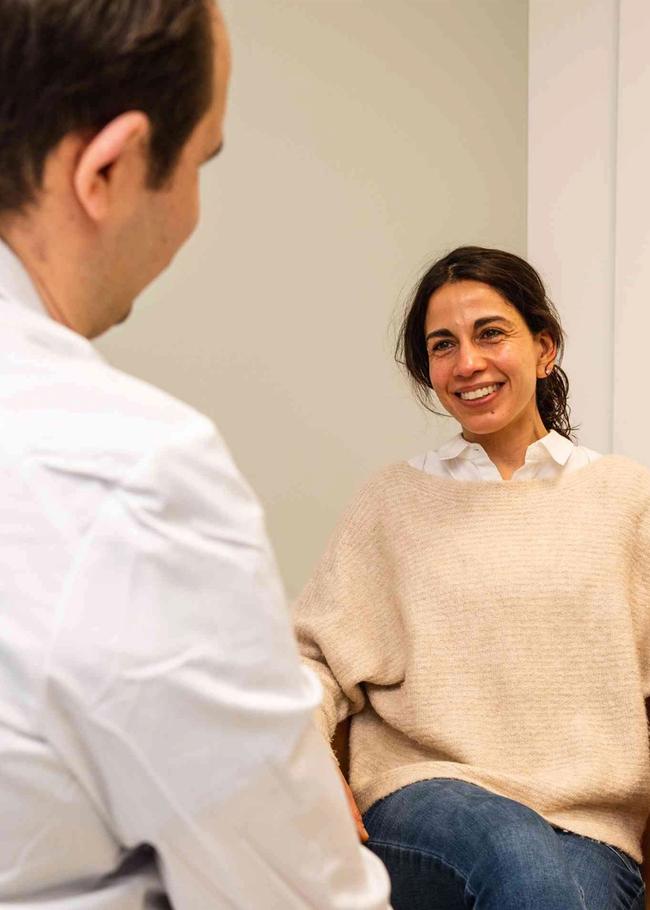
Why choose the AcneClinic?
Medical treatment of acne with scientifically documented medications, guidance and follow-up.

The choice of consultation type should be based on whether you have prior experience with medical treatment and the severity of your skin condition. If you live near Oslo, Bergen, or Stavanger, you can receive help at one of our dermatology clinics. If you are outside these areas, we also offer digital consultations.
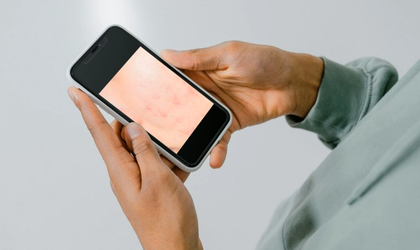
An affordable alternative.
Used for the first acne treatment or for mild acne.

Over video, our dermatologists can help you with moderate to severe acne, scarring acne, or if previous drug treatment has not produced the desired results.
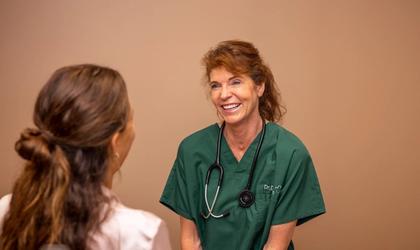
In the clinic, our dermatologists can help you with moderate to severe acne, scarring acne, or if previous drug treatment has not produced the desired result.



In the case of moderate to severe acne, or acne with scarring, proper treatment may involve a longer medical follow-up. In such cases, our acne pack may be the right choice for you.
"Acne package" for you with severe acne. Read more here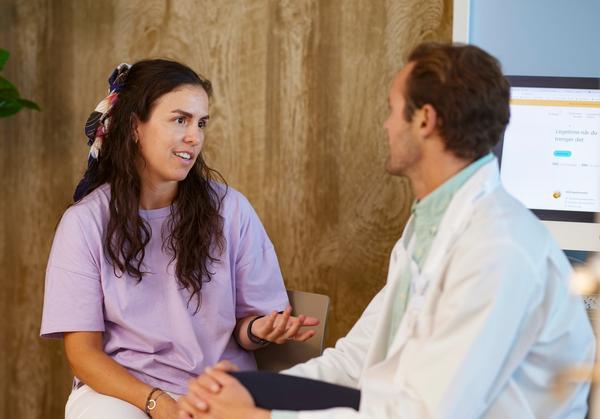

Why choose the AcneClinic?
At Akneklinikken, we understand that acne can be a significant burden, both physically and mentally. Many acne sufferers feel that their condition is not always taken seriously by those around them, despite the fact that acne can have a profound impact on self-esteem, mental health and social life.
Unfortunately, there is still a widespread misconception in society that acne is a "juvenile affliction" that will go away on its own, which can lead to acne sufferers not getting the treatment they need.
Misconceptions and stigma: Many people think that acne is just a temporary problem that doesn't need treatment, or that it's caused solely by poor hygiene or diet. These are misconceptions that can lead to acne being trivialized and those with acne not seeking professional help.
Lack of knowledge: Even in healthcare, there can be a lack of up-to-date knowledge about the many effective treatments available for acne today. This can result in patients not receiving the best advice or treatment options.
At Dr. Dropin Akneklinikk, we believe that everyone who struggles with acne deserves to be taken seriously and have access to the right treatment. Today there is a lot of good research-based knowledge that should be put to use.
Our experienced dermatologists are here to listen to your concerns, give you a thorough assessment and offer an individualized treatment plan using the most effective methods, whether through a digital consultation or in one of our clinics.
Book an appointmentAt Dr. Dropin AcneClinic, we are proud to have some of Norway's most experienced and dedicated dermatologists as part of our team.
They bring a deep understanding of skin health, a passion for patient care, and a strong commitment to helping you with your skin concerns.
With over 10 years' experience as a dermatologist, Dr. Sohrabi has an extensive knowledge base for skin disorders. He is known for his empathetic approach and the ability to listen to his patients' needs. Dr. Sohrabi specializes in the treatment of acne and has helped countless patients achieve healthy skin through customized treatment plans.
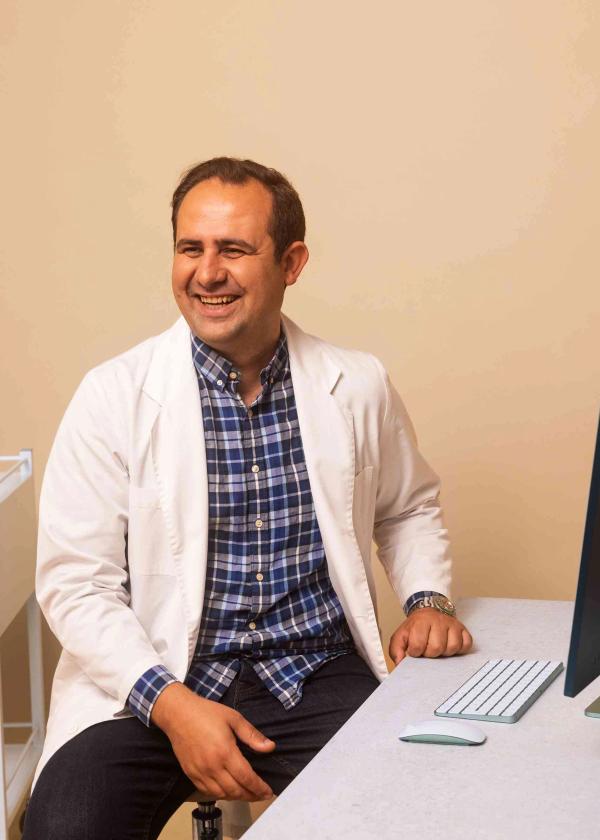
Dr. Gramstad brings a unique combination of clinical experience and research-based knowledge to Dr. Dropin Acne Clinic. With a background in both a practical approach and dermatological research, Dr. Gramstad has an in-depth understanding of the latest treatment methods. He emphasizes that the approach to acne and other skin diseases must be evidence-based.

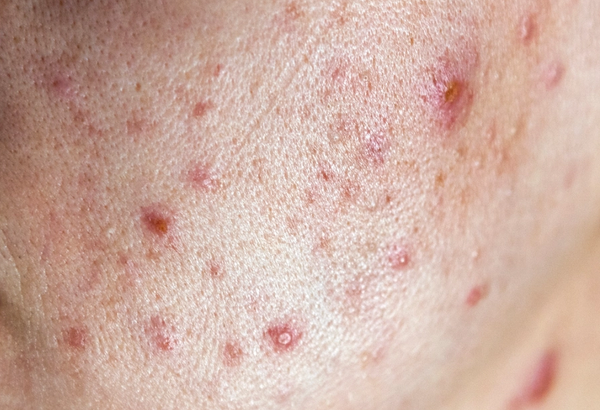
At Dr. Dropin, we have one of the market's most advanced lasers, the Fotona Dynamis SP Pro, for the removal of acne scars.
Read more about laser treatment of acne scars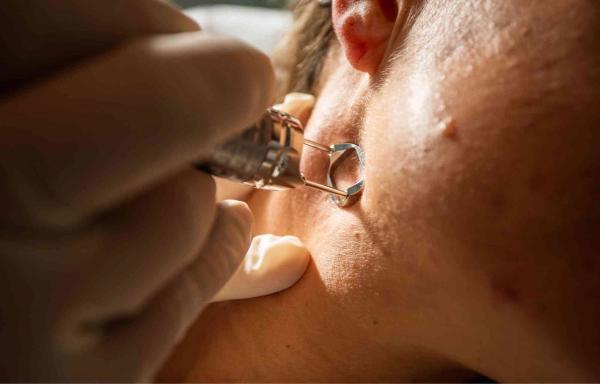
Acne is a common skin condition that occurs when hair follicles become clogged with oil and dead skin cells. This can lead to pimples, cysts, and inflammation.
Acne is a common skin condition that occurs when hair follicles become clogged with oil and dead skin cells. This can lead to pimples, cysts, and inflammation.
Acne can be caused by hormonal changes, genetics, stress, and the use of certain skincare products. Diet and environmental factors can also play a role.
Acne can be caused by hormonal changes, genetics, stress, and the use of certain skincare products. Diet and environmental factors can also play a role.
Acne can be treated with various methods, including topical creams, medications, and professional skincare treatments. Treatment depends on the severity of the acne.
Acne can be treated with various methods, including topical creams, medications, and professional skincare treatments. Treatment depends on the severity of the acne.
Yes, there are effective treatments for severe acne, which may include strong medications and specialized skincare treatments. Consult one of our dermatologists for suitable options.
Yes, there are effective treatments for severe acne, which may include strong medications and specialized skincare treatments. Consult one of our dermatologists for suitable options.
Yes, some acne treatments can have side effects, such as dry skin or irritation. It is important to discuss potential risks with a dermatologist before starting treatment.
Yes, some acne treatments can have side effects, such as dry skin or irritation. It is important to discuss potential risks with a dermatologist before starting treatment.
Professional acne treatment offers targeted and effective care tailored to your specific needs. Dermatologists have access to advanced treatment methods and can provide personalized advice.
Professional acne treatment offers targeted and effective care tailored to your specific needs. Dermatologists have access to advanced treatment methods and can provide personalized advice.
To find the best treatment for you, consult a dermatologist who can assess your skin condition and recommend the most effective solution.
To find the best treatment for you, consult a dermatologist who can assess your skin condition and recommend the most effective solution.
For severe acne, stronger treatments may be necessary, including prescription medications and systemic therapies. It's important to consult a dermatologist to find the best solution.
For severe acne, stronger treatments may be necessary, including prescription medications and systemic therapies. It's important to consult a dermatologist to find the best solution.
Yes, strong acne medications can have side effects such as dry skin, lip and eye irritation, and in some cases, more serious effects. Your dermatologist will inform you of potential risks before starting treatment.
Yes, strong acne medications can have side effects such as dry skin, lip and eye irritation, and in some cases, more serious effects. Your dermatologist will inform you of potential risks before starting treatment.
Treatment for severe acne can last several months, depending on how well your skin responds. Regular check-ups with your dermatologist are important to ensure the treatment is working effectively.
Treatment for severe acne can last several months, depending on how well your skin responds. Regular check-ups with your dermatologist are important to ensure the treatment is working effectively.
Systemic treatment is often recommended for those who have tried other acne treatments without success or for those with severe, persistent acne that does not respond to topical treatments.
Systemic treatment is often recommended for those who have tried other acne treatments without success or for those with severe, persistent acne that does not respond to topical treatments.
It's important to consult your dermatologist before using other skincare products alongside acne treatment. Some products may exacerbate side effects or reduce the effectiveness of the treatment.
It's important to consult your dermatologist before using other skincare products alongside acne treatment. Some products may exacerbate side effects or reduce the effectiveness of the treatment.
Acne is a common skin condition that occurs when the hair follicles in the skin become clogged with sebum and dead skin cells. This can lead to inflamed areas on the skin that can vary from small, red dots to larger boils.
Acne is a common skin condition that occurs when the hair follicles in the skin become clogged with sebum and dead skin cells. This can lead to inflamed areas on the skin that can vary from small, red dots to larger boils.
Acne can be caused by several factors, including hormonal changes, genetics, stress, diet, and the use of certain skin care products. Hormonal changes during puberty are one of the most common causes.
Acne can be caused by several factors, including hormonal changes, genetics, stress, diet, and the use of certain skin care products. Hormonal changes during puberty are one of the most common causes.
Acne can be treated with a combination of skin care products, over-the-counter creams, and in some cases prescription medications. Severe cases may require treatment by a dermatologist.
Acne can be treated with a combination of skin care products, over-the-counter creams, and in some cases prescription medications. Severe cases may require treatment by a dermatologist.
The best anti-acne products often contain ingredients such as salicylic acid, benzoyl peroxide, or retinoids. These help reduce sebum production and remove dead skin cells that clog pores.
The best anti-acne products often contain ingredients such as salicylic acid, benzoyl peroxide, or retinoids. These help reduce sebum production and remove dead skin cells that clog pores.
Yes, diet can affect the condition of the skin. Food with a high sugar content or a lot of fat can contribute to increased sebum production and worsening of acne. A balanced diet with plenty of fruit, vegetables and water can contribute to better skin health.
Yes, diet can affect the condition of the skin. Food with a high sugar content or a lot of fat can contribute to increased sebum production and worsening of acne. A balanced diet with plenty of fruit, vegetables and water can contribute to better skin health.
Yes, it is common for adults to also get acne, especially women who may experience hormonal changes related to menstruation, pregnancy or the use of hormonal contraception. Stress and skin care products can also be triggering factors.
Yes, it is common for adults to also get acne, especially women who may experience hormonal changes related to menstruation, pregnancy or the use of hormonal contraception. Stress and skin care products can also be triggering factors.
To avoid scarring after pimples, it is important not to squeeze or pick at the pimples. Use sunscreen daily to protect the skin, and consider using products that promote healing and reduce inflammation. Dermatologists can also offer treatments that help reduce the risk of scarring.
To avoid scarring after pimples, it is important not to squeeze or pick at the pimples. Use sunscreen daily to protect the skin, and consider using products that promote healing and reduce inflammation. Dermatologists can also offer treatments that help reduce the risk of scarring.
If your pimples don't improve with over-the-counter products or start to cause significant scarring or pain, you should see a dermatologist. Dermatologists can offer stronger treatments and advise on the best way to deal with acne
If your pimples don't improve with over-the-counter products or start to cause significant scarring or pain, you should see a dermatologist. Dermatologists can offer stronger treatments and advise on the best way to deal with acne
If you have agreed with the dermatologist to take a blood test at the Fürst laboratory, you only need to show up at Fürst to take the sample. The dermatologist will then be notified when the result is ready. If you do not live in a city that has the Fürst laboratory, you can take the samples from your GP or other general practitioner, then you must inform the dermatologist about this and ask for a blood sample requisition.
If you have agreed with the dermatologist to take a blood test at the Fürst laboratory, you only need to show up at Fürst to take the sample. The dermatologist will then be notified when the result is ready. If you do not live in a city that has the Fürst laboratory, you can take the samples from your GP or other general practitioner, then you must inform the dermatologist about this and ask for a blood sample requisition.
Yes, you can. But it is a part of the preparations you should not use so it is important to consult a doctor and inform that you are pregnant, then the doctor will find the right treatment that is safe for both you and the child.
Yes, you can. But it is a part of the preparations you should not use so it is important to consult a doctor and inform that you are pregnant, then the doctor will find the right treatment that is safe for both you and the child.
It is not dangerous, but one is anxious about the development of resistance to antibiotics, which means that your own bacteria in the body learn to recognize this antibiotic and develop defence mechanisms so that the antibiotic no longer works.
It is not dangerous, but one is anxious about the development of resistance to antibiotics, which means that your own bacteria in the body learn to recognize this antibiotic and develop defence mechanisms so that the antibiotic no longer works.
What you can do yourself is to be good at washing your face with soap and soap/cleansers that are gentle on the skin and have a pH of around 6.5, use mild products with little fat in them, avoid taking too much on your face and do not scratch up the acne elements. If you have received local treatment from your doctor, it is important to apply this all over your face, and not just where there is an outbreak.
What you can do yourself is to be good at washing your face with soap and soap/cleansers that are gentle on the skin and have a pH of around 6.5, use mild products with little fat in them, avoid taking too much on your face and do not scratch up the acne elements. If you have received local treatment from your doctor, it is important to apply this all over your face, and not just where there is an outbreak.
No, acne is not contagious. The bacterium that helps to aggravate acne is a bacterium that is normally found on our skin, but with acne, it causes a gateway to create infection and an environment is formed in which it thrives well.
No, acne is not contagious. The bacterium that helps to aggravate acne is a bacterium that is normally found on our skin, but with acne, it causes a gateway to create infection and an environment is formed in which it thrives well.
Dermatologists can diagnose and treat most skin conditions. Our dermatologists have high expertise and experience from both the private and public sectors. They are dedicated to providing you with the best treatment and making it as efficient as possible for you as a patient. Therefore, we always strive to perform treatment and surgery during your consultation with us. In cases where it is deemed appropriate, we can also assist with referring you to the public healthcare system.
Dermatologists can diagnose and treat most skin conditions. Our dermatologists have high expertise and experience from both the private and public sectors. They are dedicated to providing you with the best treatment and making it as efficient as possible for you as a patient. Therefore, we always strive to perform treatment and surgery during your consultation with us. In cases where it is deemed appropriate, we can also assist with referring you to the public healthcare system.
Our skin nurses often assist during the consultation, and in certain treatments will continue the follow-up after you have been with us. This applies, for example, to sweat treatment with Botox, where you always have to be first assessed by a dermatologist, but then treated by a nurse, or further treated with warts.
Our nurses also carry out their own treatments which you can book directly with them, for example when removing skin tags, milia or cherry angiomas, or when removing hair growth with our hair removal laser. In cases where the nurse is unsure of the diagnosis, the nurse will recommend that you see a dermatologist instead. You will then not pay for a consultation with a nurse.
Our skin nurses often assist during the consultation, and in certain treatments will continue the follow-up after you have been with us. This applies, for example, to sweat treatment with Botox, where you always have to be first assessed by a dermatologist, but then treated by a nurse, or further treated with warts.
Our nurses also carry out their own treatments which you can book directly with them, for example when removing skin tags, milia or cherry angiomas, or when removing hair growth with our hair removal laser. In cases where the nurse is unsure of the diagnosis, the nurse will recommend that you see a dermatologist instead. You will then not pay for a consultation with a nurse.
You can visit the clinic for any skin disorders, and here you will also have the opportunity to undergo surgery or removal if necessary. Particularly for the examination of moles, other types of spots, or growths, it is recommended to come to the clinic. This also applies to the treatment of scabies. This is done so that the dermatologist can examine you with a dermatoscope or microscope to provide an accurate diagnosis and perform a biopsy if needed. It is also in the clinic where we offer treatments such as laser therapy and PDT (Photodynamic Therapy).
You can visit the clinic for any skin disorders, and here you will also have the opportunity to undergo surgery or removal if necessary. Particularly for the examination of moles, other types of spots, or growths, it is recommended to come to the clinic. This also applies to the treatment of scabies. This is done so that the dermatologist can examine you with a dermatoscope or microscope to provide an accurate diagnosis and perform a biopsy if needed. It is also in the clinic where we offer treatments such as laser therapy and PDT (Photodynamic Therapy).
A great many skin disorders can be solved via imaging, such as rashes, eczema, mouth sores, hives, etc. You can also get help to treat acne via a photo, but if you want treatment for severe acne where you have tried most everything else, you should have a consultation with a dermatologist via video or in a clinic. The doctor will be able to write a prescription and give clear advice/instructions for treatment and prevention.
A great many skin disorders can be solved via imaging, such as rashes, eczema, mouth sores, hives, etc. You can also get help to treat acne via a photo, but if you want treatment for severe acne where you have tried most everything else, you should have a consultation with a dermatologist via video or in a clinic. The doctor will be able to write a prescription and give clear advice/instructions for treatment and prevention.
Video is a good way to get help with many different skin disorders, such as acne, rosacea, rashes etc. In the case of moles, the actual picture is even better, otherwise, it is always smart to come into a physical clinic so that we can assess you with a dermatoscopy. In the case of acne and other problems where there is a need to talk more about symptoms and consider treatment, a video would be a good alternative.
Video is a good way to get help with many different skin disorders, such as acne, rosacea, rashes etc. In the case of moles, the actual picture is even better, otherwise, it is always smart to come into a physical clinic so that we can assess you with a dermatoscopy. In the case of acne and other problems where there is a need to talk more about symptoms and consider treatment, a video would be a good alternative.
If you wish for your regular doctor to be informed about the topic and content of your appointment with Dr.Dropin, the doctor who treated you will send this information to your regular doctor.
If you wish for your regular doctor to be informed about the topic and content of your appointment with Dr.Dropin, the doctor who treated you will send this information to your regular doctor.